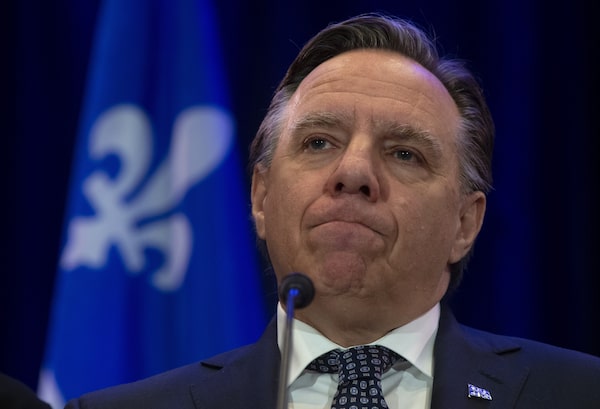
Quebec Premier Francois Legault speaks with the media during a news conference in Gatineau, Que., Wednesday, January 30, 2019.Adrian Wyld/The Canadian Press
The Quebec government will invoke the notwithstanding clause for its proposed law that will bar key provincial employees from wearing Muslim headscarves and other symbols of religious observance, a move aimed at pre-empting Charter challenges.
The bill, scheduled to be tabled on Thursday, will prevent workers in a “position of authority” from wearing religious symbols on the job. It will affect teachers and principals in public schools, judges and police officers as well as other provincial employees who carry guns on the job, said provincial sources who were granted anonymity to discuss the legislation.
It will allow current employees to continue wearing religious symbols at work while imposing the restrictions on new hires or those who change jobs, the sources added.
In the run-up to tabling the legislation, the government has indicated in recent weeks that it is open to eventually removing the crucifix in the National Assembly. A decision is expected to be made by MNAs after the new legislation is adopted.
Explainer: Legault Year One: How the CAQ has transformed Quebec so far
The notwithstanding clause, also known as Section 33 of the Canadian Charter of Rights and Freedoms, is a seldom-used, controversial part of the Constitution that allows government legislation to override some parts of the Charter for up to five years at a time.
The last time it was used, in 2017, then-Saskatchewan premier Brad Wall invoked it to override a court ruling that would have removed funding for non-Catholic students attending Catholic schools.
Quebec governments of various stripes have used it over the years, but the last time it created a storm of controversy was in 1988, when premier Robert Bourassa used the measure to adopt a restrictive language law.
For its part, the federal government has never invoked the notwithstanding clause.
The religious symbols legislation is set to aggravate the continuing clash between the provincial government and Ottawa. Prime Minister Justin Trudeau has been vocal about protecting religious minorities throughout the country and limiting the use of the notwithstanding clause. The two governments have also been waging public battles on infrastructure spending and the possibility of allowing the Quebec revenue agency to collect federal income taxes.
Opinion: As Quebec tables religious symbol ban, the rest of Canada should stay zen
Nine lawyers – three of them university professors – have signed a letter warning the Quebec government that using the clause should be reserved for “exceptional” situations. By including it in the initial legislation, Quebec would pre-empt a legal challenge that allows opponents of the law to have their day in court, the lawyers argue.
“The rush to invoke the notwithstanding clause … indicates to some members of society that their rights aren’t important enough to have to justify limiting them,” the letter says.
Robert Leckey, dean of law at McGill University and a signatory of the letter, referred to the notwithstanding clause as the “nuclear weapon” of legislative options and said the Quebec government is resorting to it “because they believe that the law would not pass constitutional muster."
“But I think there are reasons the law wouldn’t pass constitutional muster that the government should take very seriously,” he said. “I think there’s no valid objective and the means chosen are disproportionate and will harm some people without producing much of a benefit.”
However, Premier François Legault defended the use of the clause this week as a way of protecting Quebec’s identity.
“When you’re talking about protecting values, protecting our language, protecting what we have that is different in Quebec, you have to be ready to use it,” he told reporters on Tuesday, noting the need “to protect collective rights."
Polls have shown the government has the support of a majority of Quebeckers to enact new legislation that would be in line with the recommendations of the 2008 Bouchard-Taylor Commission, which suggested limiting the wearing of religious symbols among specific classes of provincial employees.
Mr. Trudeau denounced the use of the notwithstanding clause when the Ontario government was set to use it last year in relation to changes to the municipal election process.
The Prime Minister has also frequently spoken out against proposed legislation in Quebec that would seek to determine what people – especially Muslim women – can and cannot wear.
The Conservative Party of Canada, on the other hand, has said it will respect the Quebec government’s right to enact legislation in its areas of jurisdiction.
Members of Mr. Legault’s Coalition Avenir Québec government have repeatedly used the will of the majority to justify their actions, but Prof. Leckey cautioned against overriding constitutional rights to satisfy the majority.
“We have charters of rights precisely because we didn’t want to let popular opinion dictate how we treat minorities," he said.